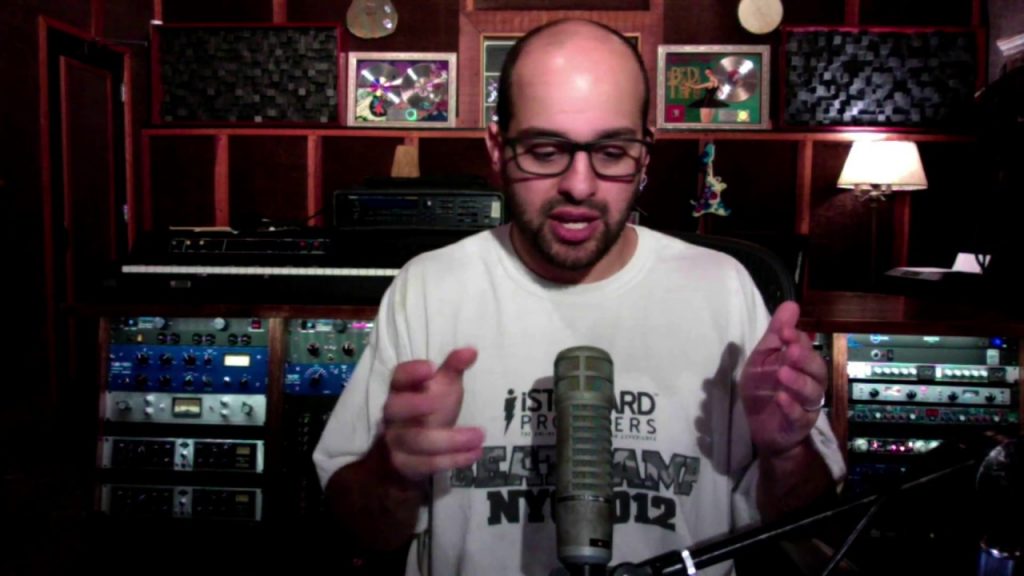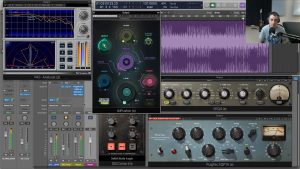How Do I Make Money as an Audio Engineer?

Hey folks, Matthew Weiss here — weiss-sound.com, theproaudiofiles.com, and tonight, we’re going to answer the question, “How do I make money as an audio engineer?” This is a question I get pretty often, and I always have the same answer, it’s two steps.
Step number 1, get really good at what you do, step number 2, make sure everybody knows it.
Now of course, this is much easier said than done, so I’m going to give you the heads up, this is not a sprint.
This is a marathon.
When you decide you want to pursue this career, understand this is a 10 year process before you start making regular income, but I’m going to start breaking down these steps in a way that makes sense.
Okay.
Number one, get really good at what you’re going to do.
The backbone of this industry is being able to do the job.
It is very, very competitive, and people are going to put you to the test.
So getting good is definitely paramount here.
The best way to get good is tacit knowledge, which means hands-on experience, and there’s a few ways you can get hands-on experience.
The number one way is auto-didactically.
So teaching yourself.

So let’s say you want to be a mixer for example, you get yourself a DAW, you get a computer, you start going online, you download stems, you go to mix competitions, you download the stems, and you just mix.
And you mix for 5-7 hours every single day, because that’s what the musicians on the other side of the glass are doing, they’re picking up their instrument and they’re playing 5-7 hours a day to get really good at it, so you owe it to them to be putting in that same kind of effort.
Okay, number two is to get yourself in the right environment for it.
So for example, going to an audio school.
Now, I think there’s pros and cons to going to schools.
There’s definitely good reasons not to, but if you are going to go to an audio school, the question I would ask the students, the faculty, the alum, is how much hands on experience am I going to get? And if the answer is tons of it, then you can consider going to that school.
If the answer is anything else, you need to pack your bags and you need to run, because it ain’t worth the price of admission.
Of course, the other way to get hands on experience is an internship.
Internships are hard to get, but if you put your effort in, you just keep being persistent, you can get in there, you can do it.
And of course, you can do it the way that I did it, which is to simply bug the living crap out of every musician in Philadelphia, and say, “Hey, I will do whatever it takes to record you.
I’ll record you in a garage, I will record you in a studio, I will help you pay the way to get into a studio so that I can record you there in that professional environment,” and you’ll simply learn by doing it.
Which, incidentally, is how I got my first in-house position, but whether or not that works out for you, the bottom line is that you get that experience.
Okay, and the third way is supplementary knowledge.
Supplementary knowledge is what you’re doing right now, watching this tutorial.
Going to give you a shameless product pitch, if you happen to be in the world of mixing, if that’s something that you need to learn, I believe that I make the best mix tutorials on the market.
I’ve got that link in the description.
I know that that is a totally shameless product pitch, but I stand by it.
I am very passionate about teaching, and I believe that I do it in a way that can really accelerate your learning process.
You know, my goal is to make it so that what would take you 10 years to learn, you can cover in three.
Okay, so the fourth component of getting really good at what you do is understanding that the whole process of making records is a bunch of moving parts, and every gear kind of turns the other one, so even if you’re say, focused on being a mix engineer for example, it’s really important that you at least understand what happens in the world of mastering, what happens in the world of recording, and I would say that it’s also really important that you pick up an instrument and you at least learn your way around it a little bit.
I myself have picked up maybe seven or eight different instruments, only to put them back down again because I’ve never really taken to any of them, but at least good enough so I can get, like, some scales and notes coming out so that when there’s somebody on the other side of the glass, like say, a guitar player, and their sound needs to be brighter, instead of reaching for an EQ, I can say, “Hey, can you switch over to the bridge pickup?” Or you know, “Move your playing hand a little closer to the bridge,” and that’s going to produce a brighter sound.
I know this because I know the instrument well enough to know that.
That’s a really important part of this whole process, so you know, learning a little bit of theory, learning a little bit of arrangement, and learning a little bit of electronics is also really important.
You know, if you can pop open your preamp and you can take a volt meter and say, you know, “Okay, this cap, it looks like it’s maybe not running so great, alright, let’s grab a little wire cutter,” and snip snip, and pull it up, then you put another cap right on in there, and you solder, and there you go, you’re good to go.
You’ve done a little minor gear repair.
Not only does this save you a lot of money, and not only does it really help if you’re going for an internship and that’s one of your skills, but also it gives you an understanding of how the actual electronics work, and that’s a really valuable part of this whole process as well.
Okay, now the getting everybody to know it part, this is a process where the getting good leads the charge, and the getting other people to know it follows in suit.
So a lot of people I think make the mistake of trying to go online and say, “Hey, here I am! I have a DAW and I can mix records!” Or, “I have Ozone and I can master records!” And it’s like, that’s all well and good, but at the end of the day, it’s a very, very, competitive, saturated market, with a very low ceiling, particularly online, and so you’re going to find that model will fizzle out fairly quickly.
The cream will rise to the top, and the online world is not really the best place to develop that.
The best place to develop that is real life, in your location.
Chances are, wherever you are, there is a community of musicians, and it is your job to know all of them, and make sure all of them know you, so go to the gigs.
Talk to them.
When you’re doing this, you start learning about their experiences.
You know, if you play an instrument, join a band.
You want to know what it’s like for the musicians that you’re going to be recording and mixing, because that’s going to not only inform your musical sensibilities by asking questions like, “Hey, what do you look for in a record? What is good to you? What do you think makes a song work once the microphones are put in front of it?” You know, that’s supplementary experience you’re getting right there.
On top of that, you’re going to sort of understand what they go through.
You’re going to know their life when it comes to how they get paid, how they get treated, and being able to respect what bands and artists go through to get into the studio gives you an appreciation for what you need to be doing on your end.
And that’s really important, and as you develop that, you start to develop a rapport with all of these people.
The people that you meet on day one, they’re not the ones that pay off on day two, they pay off on year four, but if you start accumulating that reputation early on, as things build, as you start getting better, then you start getting the confidence and knowing that when the musicians say, “Hey, I need to trust somebody with my hard earned money and my precious art, who’s that person going to be? Oh, I know that person because they’ve been around the scene and they listen to me, and I can have confidence that they’re going to take what I’ve put so much effort into very seriously.” So I would start there, and I do think the online world is part of it, but I would just say that it’s not the heart of it.
I get good gigs from online.
I’d say for like, every one good gig, there’s probably about maybe 50 that are just not worth the time and effort and probably don’t get past the negotiation stage, but for that one that is an awesome client, it’s totally worth it for sure.
It’s just not the beating heart of the business, from my experience.
Okay, so a couple of other things that have just personally helped me, this is going to sound a little bit ridiculous, but I’m going to put it out there because I think it’s worth knowing, one of the things that really helped me was watching Shark Tank. [laughs] I know how stupid that sounds, but you know, watching that show, it was like, I’m a musician.
I’m in the world of music, I think emotionally, I see the best, and I’m very optimistic, and you know, I function the way artists function.
Those guys are business guys.
They are straight to the point, they talk money, they think money, and watching people talk that way has opened my eyes to how business people think, and has allowed me to incorporate that thought process into the business side of it, which is very important.
So I started learning about things like equity, and royalties, and interest, and loans, and that kind of stuff.
And it’s paid off! And I’ll give you an example.
There’s a woman named Afrodile Trane, and she makes really, really fantastic R&B music that’s got like, Soul, and Hip Hop kind of tucked into it with some Jazz kind of vibes tucked into it, it’s just some really cool stuff.
She came to me and she said, “How much do you charge?” And I gave her my quote, and she said, “Okay, well I can’t pay that,” and I said, “Okay, let’s find a number that you’re comfortable with.” Because that’s important to me, I don’t try and get as much out of somebody as possible, I try to get a number that people are comfortable with, and that ended up being half my rate, and I said, “Okay, well, since I’m doing half rate, what I would like is 2% equity in your songs,” and that means that net receipts, 2% when she makes any money off of her music, I get 2% of whatever that is, and that’s the way of balancing out the money that I didn’t get up front, and by negotiating that way, that allowed me to get paid in a way where I could pay my bills, and also get paid in back end later down the line, which seems like a small and insignificant thing, but imagine if I did that 500 times.
That’s going to start to add up.
So this gave her the opportunity to work with me in a way she was comfortable with, me to work with her in a way that I was comfortable with, and a means in which I was able to get what I was worth.
And this is now a year and a half later, where she’s starting to get some sync placements, so I’m seeing, okay, this is something that does pay off down the line for this particular project, not every time you negotiate for back end will work, but at the time, when I was making this decision, I said, “Okay, well, she’s taking it very seriously, her music is awesome, I love it, and she’s got some connections, and she’s got some established producers that she’s working with, so is this something that could make some money on the back end? Absolutely, it can!” So you know, you think that way, and then the other thing to think about is, you know, your strategy in terms of a negotiation.
I used to give out a card rate, when people said, “What do you cost?” I said, “Here’s what I cost,” but I started realizing that model doesn’t actually make sense.
It’s actually slightly disingenuous, because there’s a spectrum of the way projects go down.
You’ve got your Pop projects where it’s like, chances are if I’m mixing a Pop project, I’m going to be working on it for one, two, maybe as many as three days, because the revisions can add up since there’s so many different cooks that are in the kitchen, and there’s huge track counts, you know, 50 vocals, 100 instruments, there’s pitch correction involved, editing involved, I mean, it’s really a process.
It can take a long time.
In that same span of time, I can mix an entire Jazz album, because the players are taking care of their tone, the players are taking care of their dynamics, the recordist probably recorded it in a very similar setup from song one to song ten, and so once I get that first song right, everything else just dominos really easily, and so it doesn’t make the same sense to charge in the same structure for a Pop song as it would to work in a Jazz song, so it’s like, you know, when I charge for one Jazz song, maybe that makes a bit more sense to have a similar pricing structure, but if it’s a full project, no, definitely not.
So thinking this way has allowed me to get more gigs in the door.
Realistically, how long does it take me to work on an EDM song? Well, if I’m counting revisions, probably 10 hours.
Something like that.
The clients just tend to be really micro-managerial, they’re super tuned into their sound, it is a very sonically competitive genre where everything has to sound like everything else and be the biggest, brightest, boomiest, kickiest, most dynamic, most loud that it can be.
It’s really, it’s a taxing process.
A Rap song? I can do that in three or four hours, and I can do that without cutting corners.
It will sound like a full day mix, so do I need to charge the same for both projects? Absolutely not.
Different pricing structure for different projects.
So I hope that this little talk tutorial thing has given you some food for thought, and means in which you can conduct your business.
You know, just understand that you’re going to be driving that Uber for a little while at first.
That’s okay.
That’s a transitional stage for you where you’re going to be getting better at the same time you’re going to be building clientele and letting people know, and you’re segueing into being full time.
That’s going to take you 5 to 10 years, and just brace yourself for that.
Be focused, be patient, you’ll get there.
It’s just not going to happen overnight.
Anyway, I’ll leave it at that, and if you like this video, please hit that like button.
If you dig what I’m doing on this channel, definitely hit that subscribe button, and I pitched the product before, but I’m just going to pitch it again.
If you want to strengthen your game when it comes to mixing, I think I’ve got the best supplementary stuff online, it’s going to accelerate your learning process.
What would take you five years, you’re going to get down under your belt in two after watching these tutorials, and the link to that is going to be in the description below.
Alright guys, until next time.
Original post found at https://www.youtube.com/watch?v=4c9iNXADCL0




